Last week the water industry gathered in Amsterdam for the biennial Aquatech Trade Show/Innovation Forum/International Water Week. In Europe, this event stands tall amongst the slew of national-focused conferences and environmental technology-spanning trade shows. Aquatech showcases one of the widest looks at the sector from manufacturers to service providers, municipal to industrial applications.
This year’s edition accentuated the focus on digitalization and what it means for all stakeholders in the industry. Over two days of sessions at the Innovation Forum, and out on the exhibition floor, delegates presented, debated, and critiqued the current onslaught of technology solutions aimed to transform the sector’s functioning.
The good news: many ‘cutting edge’ or ‘disruptive’ technologies that might make utility managers skittish a few years ago are now becoming mainstream, especially on the instrumentation side (e.g. acoustic correlators, smart meters, pressure loggers). The less good news: there is still a major lack of consensus on some fundamental issues regarding digital transformation, leading to a still highly fragmented, relatively inefficient implementation of new solutions. Our takeaways on this dynamic include:
- Collaboration needed…but not forthcoming. Faced with complex procurement decisions, utilities continue to grapple with their ‘platform of platforms’ which Bluefield has mapped in its asset management study. UK utility experiences suggest that reinventing the wheel is systemic, and this perpetuates a lack of standardization due to a fragmented vendor landscape. This, in turn, leads to inertia on the one hand (no innovation due to concerns over obsolescence) or significant inefficiency as tasks are duplicated in handling data across different departments. There is hope, however, as organizations centralize innovation initiatives and look to coordinate better among their partners (e.g. Anglian Water’s Shop Window).

- Aging workforce a golden opportunity for digital transformation. While much has been made of retiring engineers, a ‘silver tsunami’, recent industry personnel reports suggest that the water sector is not significantly older than others. As engineers age out of the ranks, there is pressure to transfer knowledge that instigates better data management, as well as cross-departmental coordination as older employees work with younger recruits. Rather than exacerbating the generational gap, technology can be used to bring them together if properly implemented.
- Digital twin moves toward common definition, objectives. Moving from the abstract to a more concrete definition, utilities and vendors productively discussed the possibilities of digital twins. The Centre for Digital Built Britain recently laid out its multi-sectorial Gemini Principles as a mission statement for a national twin, while recognizing that each city and utility will have its own take on it as the organization proceeds on its digital journey. The nuts and bolts that underpin digital twins are clearer and include SCADA integration, hydraulic model linkage, and increased sensor deployment. Integration of these components, working towards clear operational objectives, is an encouraging sign for the sector as laid out by Spanish solutions provider GO AIGUA.

- Increasing solutions complexity requires increasingly skilled sales. As digital solutions providers vie for positioning as a platform for utilities, the overall complexity of the offering continues to increase. Practically all hardware providers are moving towards higher-margin SaaS models. And SaaS providers are increasingly adding analytics of new data sets. These added features require a different type of sales force that must engage in a more consultative commercial process and act as integrators more than product distributors. This is particularly on display with firms such as Innovyze that have gone from a narrow scope of modeling tasks to shaping operational management through a digital twin.
Aquatech’s tagline for its Innovation Forum was “Mastering Water’s Digital Transformation”, an ambitious undertaking for such a multi-faceted challenge. While it may be impossible to master the constantly changing nature of this transformation, the industry is moving closer to setting desired outcomes, defining the challenges, and testing new solutions.

